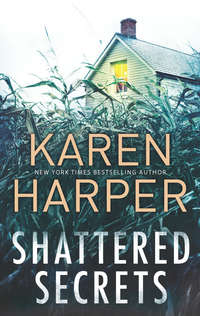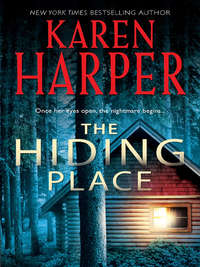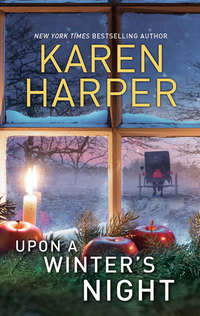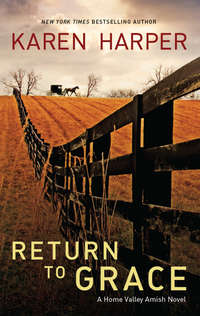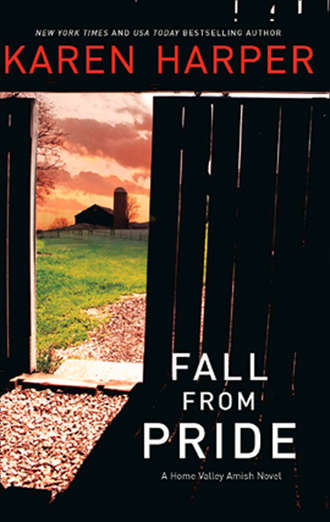
Полная версия
Fall From Pride
He drove VERA back past the Kauffman place, wishing he’d see Sarah, but no one was out for once—just laundry flapping on the line, blacks and pastels, men’s and women’s, big and small, the daily life of an Amish family, all hung tight together.
He parked VERA and stripped to his underwear and waded into the pond. When he saw the water was deep enough, he dived. It felt fantastic, cool, refreshing. Like a kid he swam on his back, splashing. He should have brought some soap out. He floated, then treaded water in the center of the pond, listening to the sounds of the wind through the maples and oaks, birdsong. He stared up at the blue sky with cotton clouds for he didn’t know how long.
Suddenly a voice called out, “You shouldn’t swim alone, you know. It could be dangerous.”
6
“DANGEROUS HOW?” NATE ASKED. HE SPUN AROUND to see Sarah with a large package in her arms.
“This just came for you at the house—FedEx,” she called to him. “Now that you’ve announced it was arson and you’re going to find the arsonist and send him to jail, what if he tries to hurt you?”
Nate swam toward her side of the pond, his muscular arms lifting from the surface at each stroke. When he was close enough to talk easily he stopped and treaded water. “You startled me, though I was expecting that package. It’s my fire protection hood. It wasn’t packed in VERA when I left. And thanks for worrying about my safety, but arsonists are usually cowards about confrontation. The arsonist wants my attention, not to get rid of me, but I’ll be on my guard.”
You won’t if you’re splashing around like a kid and not paying attention to who’s approaching, she thought, but she just nodded. As he remained fairly motionless about twenty feet away, she could see a lot of skin through the water. What if he was in there buck naked, because why would he have brought an ausländer swimsuit?
“So you fight fires, too?” she asked, hugging the package to her breasts. She’d come out here barefoot, a common practice among her people in the warm weather, especially on their own property. She fought the desire to sit down and dangle her feet in the pond. Though she’d done that a hundred times and her family shared ownership of this woodlot with the Eshes and the Lantzes, it suddenly felt like forbidden, foreign territory.
“I don’t fight fires if I can help it, but I don’t hesitate to go into a partially burned building or even one on fire if it will help me trap an arsonist. If you wouldn’t mind turning around for a minute, I’m not exactly clothed in here, and I’ll get out.”
“Oh, sure. Right,” she said, and sat down facing away with her back to the pond. Beneath the shade of her bonnet, her cheeks flamed. She stretched out her legs. Her toes barely peeked from under her moss-green skirt. “I’ll bet it feels good in there,” she said, hoping he didn’t think she was fishing for an invitation to join him. His voice had faded a bit, and she heard the water rippling as he evidently swam away.
“Sure does. I’ve got a washbasin and head—sorry, toilet—in VERA but no shower.”
“I’ll bet Daad will let you use ours if you want. I was going to send Gabe out with this package, but he took his buggy over to see his friend, Barbara Lantz, two farms over.”
“I take it your family’s close to them, but no quilt square on their barn yet?”
“It was decided first the bishop, then two elders, then the Millers wanted one. I’ve done those, but since then, no one else has come forward to ask for another. But your mentioning the Lantzes reminds me there’s a second reason to be careful in this pond. There’s a strange, cold current in it sometimes,” she said, still talking toward the trees. “I think there’s an underground spring that flows through it, especially after a rain. When we were teenagers and swimming here, Ella did a little jackknife dive and just kind of stayed under. Hannah and I about went off our beans—panicked, you know. We dived and found her and pulled her up but we could feel the colder current pulling us deep down, very scary. We had to almost pump the water out of her. She—well, she changed after that, got very rigid and strict with herself and others, always followed every rule.”
“So Ella Lantz owes you two her life,” he said, his voice coming closer until he stood in front of her. He’d pulled his jeans on over his wet legs and his black T-shirt stuck to the muscles of his chest and his flat belly. His short black hair looked even darker all wet. For a second she couldn’t recall what he’d just asked.
“Oh, we don’t think of it that way,” she told him. “It was the Lord who saved her, and we were just His way of doing it. No thanks needed, and we didn’t even let outsiders know, though someone blabbed, and it got into the Home Valley News.”
Nate reached down to her, and she gave him his package before she realized that he had meant to give her a hand up. His skin was cool from the water, or else hers was hot. Both barefoot, they walked back around the pond where he had VERA parked beside two big oaks. The vehicle had a tall, thin tower projecting upward from the back, and from that sprouted a five-branched antenna.
“Peter Clawson’s really got his ear to the ground around here, doesn’t he?” Nate asked. “I need to interview him about any leads he may have.”
“He keeps a lot of Amish employed in businesses he at least owns part of—the Dutch Farm Table, the Buggy Wheel Shop, a bunch of others. But his paper is his pride and joy.”
“Can I show you around VERA?” he offered with a sweep of his hand toward his big, worldly buggy.
“I’d like that, but better not right now. I have to get back. Gabe wants to see it, too, so can we come out later? And, oh, Mamm says come to supper—evening meal, not half the amount we eat midday, in about two hours.”
“Tell her thanks. I’d love to.”
She wanted to throw caution to the sweet breeze that had begun to dry and ruffle his hair and go into the back of VERA with him—it was cozy there, he’d said—but she knew she shouldn’t. She was already too attracted to him, like he had some kind of magnetic field and she was a compass needle.
“Before you go, then,” he said as he walked her back a ways toward the farm, “will you explain the alms fund one of the elders mentioned? It sounds like private Amish insurance, but I thought that was forbidden.” Forbidden, verboten, danced through her mind as she darted another glance up into his intense, blue-sky gaze. Again, she had to unscramble her thoughts to grab for the right thing to say.
“Not forbidden if we keep it within the Amish community,” she explained. “We do not pay into worldly insurance companies or the American government’s Social Security or ever use such funds, because health is a gift from God and that would be gambling against that in a way. But we do collect a percentage of everyone’s wages on a regular basis and use that to support those in the group who have big medical bills—or something like a house or barn burned. The church deacon collects and puts the money in a savings account until we need it. No big corporations profit. The family in need does pay a small part of their bills first, before our fund is used.”
“Like a deductible,” he said, nodding. “It’s really a private, small group insurance. Very smart—amazing…” He looked at her closely and he drew out the last word so it almost sounded like Ray-Lynn’s drawl. His gaze caressed her as he peered within the dim shelter of her black bonnet.
“I’ve got to get back,” she said, quickening her steps. “See you for supper and then Gabe and I can take a look at VERA later, if it’s okay.”
She didn’t want to seem like she was running away, but in a way she was. Standing so close to him, both of them in their bare feet, had made her think of Adam and Eve in the Garden, and look at all the trouble they’d got into!
If the bountiful Amish evening meal was what Sarah described as less food, Nate was as astonished by that as he was by his crazy attraction to her. It was probably just the fact she was so different from any woman he’d ever known, he tried to tell himself—bright but naive, stubborn yet humble, plain yet stunning, modest yet sexy without even trying. Man, he had to keep his mind on the food and the conversation, because her father, Ben Kauffman, had been drilling him about some things and here came another calmly couched but key question. At least he’d waited for this one until they were on the coffee and fabulous strawberry shortcake with home-churned vanilla ice cream. How Nate could put this dessert away after chowing down on sauerbraten, homemade bread, German potato salad and noodles with gravy, he wasn’t sure, but maybe he was about to pay the price for this great meal.
“So far, Mr. MacKenzie,” Ben Kauffman said, “have you found any proof, even hints, that the barn burning might be someone upset by Sarah’s painted quilt square?”
“No, sir, I haven’t. But it’s something I’ve considered and will stay aware of. I realize that such a work of art is to be useful—not just decoration.”
“In that case,” Ben Kauffman went on, “I will allow—ask—Sarah to paint a square for our barn. I ran it by Bishop Esh. I want to stand up for the earlier decision that she be allowed to paint her patterns on Home Valley barns to bring more visitors in. Amish businesses are slow. Orders for my gazebos, kids’ playhouses, birdhouses and other items are down. And I want everyone to know that I believe her painting was not and should not be a target of arson.”
Nate could see Sarah was surprised and elated. Her amber eyes filled with tears she blinked back. “Danki, Daad,” she said. Darn, Nate thought, if he wasn’t actually catching on to some of the German they used. Sadly, he hadn’t been able to speak to her elderly grandmother at all. She rarely spoke English anymore, and seemed pretty afraid of him, not to mention confused about things. She sat at the other end of the table, eating, but with her eyes on him as if he might leap at her. Sarah had introduced them, then whispered something to the old lady about him being here to help and that he could be trusted. Also at the table were Sarah’s mother, Anna, Gabe and Martha.
It really impressed him how the Amish generations stuck together. When he’d lost his parents in the tragedy, how he’d wished he’d had a grandparent or even an aunt and uncle to take him in. At least his childless neighbors down the street, Jim and Mary Ellen Bosley, had been willing to give him a foster home. But living so close to where it all happened had been hard. In a way, that empty lot where what people called “the death house” had sat haunted him all through his youth—and yet today.
“I’ll have to replace my ladders,” Sarah said.
“While you paint here, you can use the barn one and only buy one,” her father said. “And those planks for the long tables you can stand on.”
“I have a ladder in my truck Sarah can use,” Nate offered, “at least while I’m here. And a safer scaffolding than planks—if you don’t mind the suggestion. I won’t need them—unless there’s another blaze to investigate, and I hope not.”
“We pray not,” Anna Kauffman said.
“If the man in black comes back, there will be more fires.” The old lady spoke for the first time and in English. “I heard Sarah tell Martha the fire burned the barn like a beast devouring it. That’s what it will be like again if that monster keeps sneaking around my house at night.”
Nate could see Sarah was embarrassed by the outburst. “If you mean Nate here,” Sarah said, leaning toward the woman and taking her hand, “he’s only in the neighborhood for a while to help. And maybe you just dreamed the man in black.”
“No, I saw him with his horrible, glowing eyes when I got up to go to the bathroom. Ya, I did!”
Sarah’s parents just looked at each other as Sarah helped the old woman away from the table. She was obviously demented. On the other hand, if she had seen someone, Nate wondered who, because it hadn’t been him.
Ray-Lynn knew Peter Clawson was a bit of a loner, but she couldn’t argue his generosity to others. Whether it was large tips for her Amish waitresses or his funding of local businesses, the man was magnanimous to a fault. And, if she thought she managed to catch all the local gossip, she was a rank amateur compared to Peter, who seemed to know almost everything about everyone. Why, if it wouldn’t be frowned on around here, he’d probably run something called the Home Valley Enquirer. She sometimes shuddered to think that he probably knew what kind of toilet paper she used at her house, though at least she’d stopped his just dropping in.
“I suppose you’re really going to talk up the Saturday auction to benefit the barn raising,” she said to him as she rang up his evening meal at the cash register.
“If not talk up, print up. You bet I will,” he said. “And not only for a broader distribution of the paper. The regular Thursday edition will have a full-page spread on it. The layout is already done. Lots of folks far and wide will come in for Amish goods at an auction, especially the cooking and the quilts.”
“I just heard about the auction and chicken barbecue from one of my girls,” she admitted as she handed Peter his change and watched him take a peppermint and a toothpick from her counter. “But then you always have your ear to the ground when it comes to business.”
“That’s right, Ray-Lynn,” he said with a wink as he smoothed his straight brown hair back from his forehead. “And, let’s face it, you are one of my most important business affairs.”
She could have kicked him, but it seemed no one else had heard. She didn’t like the suggestive way he’d worded that, because she’d done a good job holding him at bay. A good business partner, yes, but not a partner for life—no way. He was single, but he didn’t seem to look at women—that is, besides her.
Peter, at age forty-five, was balding and it obviously bothered him. Why his being overweight didn’t, she wasn’t sure, if he was so doggone concerned about his appearance. At least with his hair, he wasn’t to the stage where he’d tried a comb-over, but he was always messing with it. “Even if it’s monkey business, I’m on top of it, so don’t get too close to our illustrious sheriff, you hear now,” he added with a smug grin.
For one moment, Ray-Lynn was at a loss for words. Now how had he found out about that? Surely, Sarah hadn’t talked, so it must have been her own falling all over Jack that Peter had seen. Well, ding-dang. He was kidding her, of course, yet there was a strange edge to his voice. Surely, as well as Peter had seemed to take it that she wouldn’t date him, he wasn’t jealous.
“Monkey business?” she countered, hands on hips. “You’d better keep your mind and newspaper on the serious stuff around here, and there’s plenty of that lately.”
“I don’t like to show off my extensive knowledge of newspaper trivia, my Southern belle, but monkey business was what brought down presidential candidate Gary Hart, not to mention John Edwards. I suppose you don’t remember the details, but Gary Hart dared the press to follow him around, and they did…and found that married man—pillar of American morality—with a young mistress aboard a yacht called Monkey Business. Do you remember that?”
“No, Peter, actually, I don’t. I must have been too busy serving up mint juleps and sitting on the veranda with Scarlett O’Hara that year.”
“My point is, the newspaper people Hart dared to find out his business brought him down, just as the National Enquirer torpedoed John Edwards. Goodbye presidency, goodbye power. Ah, the power of the press. I’ll see you tomorrow, Ray-Lynn,” he concluded, speaking as usual almost in one breath as he went out and let the wooden door swing closed behind him.
Ray-Lynn wouldn’t have minded a bit if it had swung closed faster and hit him in his big rear end.
There was still a good hour of daylight left when Gabe and Sarah accompanied Nate to see VERA and to check if his ladder would suit for the quilt square she planned to paint on her own family’s barn. Though she would have preferred to have painted the entire, realistic scene of the farm, Sarah was thrilled to have another pattern to paint, one she was being allowed to select this time. And she was touched that her father believed in her work, especially when he’d been reluctant at first. More than that, she was excited to see VERA’s insides at last. Gabe was, too. He kept chattering about wanting to sit in the driver’s seat, no doubt dreaming about driving the big truck, whatever was in the back of it. As for her own dreams…
“Gabe, I’d like to ask you a question about the night of the fire,” Nate said as the three of them walked along the farm lane toward the woodlot. “On the level now, I take it some of the kids in their running-around years try smoking cigarettes.”
“Some,” Gabe said, nodding so hard his bangs bounced on his forehead under his straw hat. “A few even try pot. We’re allowed. I know it’s not good. Some kids have problems giving it up later, even tobacco cigs, I mean. You know, after they join the church, but, yeah, it’s kind of common, like maybe having a coupla beers.”
“So is there any chance someone could have sneaked across the field, maybe been around the Esh barn the night of your party but, because the party, at least inside the barn, was chaperoned by your mother and sister, wanted more privacy?”
To Sarah’s dismay, Gabe cheeks went as bright as a polished Red Delicious apple. She bit her lower lip to keep from either trying to help him out or questioning him herself. She recalled how out of breath and red-cheeked he’d been when he’d rushed into the barn to tell her Jacob was outside. Could he have come from way across the field and not only been outside their barn?
“I don’t think so,” Gabe said. “A coupla guys were smoking regular cigs outside behind the buggies—not me—but I have a time or two.”
“I’m not blaming anyone for smoking or accusing them of being an arsonist,” Nate assured him with a pat on his shoulder. “As I said, a single dropped cigarette or match in the hay was not how the barn fire started, but if some kids were over there, maybe they saw something—something they don’t even know was important for my investigation. I’d love to talk to them. I need all the help I can get,” he added as they approached VERA. “And I can keep things confidential. You know that word, Gabe—confidential?”
“Ya, Mr. MacKenzie. I can ask around and keep my ears open.”
“Good man,” Nate said, and this time hit his shoulder lightly with a balled fist.
Sarah and Gabe watched as Nate took a small bit of metal and plastic out of his pocket—not quite a key—aimed it in VERA’s direction, then pressed something. They heard a double click and VERA’s lights blinked once as if in welcome—or warning.
“Like a magic lock,” Gabe said as he climbed up into the high cab next to Nate while Sarah sat by the passenger’s side window. “Way cool.”
Sarah kept silent while Nate explained and demonstrated the various dashboard instruments. He showed them how the GPS worked and how the computer could perform other tasks. But Sarah sensed that it was just being in the big truck cab that impressed Gabe most. He kept touching the outer edge of the steering wheel and glancing out through the windshield. So her brother had a good imagination, too, just different from hers, that’s all, she thought.
“Do you want to see the magic techno-cave in back now?” he asked the wide-eyed seventeen-year-old.
“Maybe later,” Gabe said, his eyes aglow. Barbara Lantz, Sarah thought, might be jealous if she saw how her brother lusted—yes, a sin, but so human—after this big, polished, black truck cab.
“Then while I show your sister,” Nate said, “why don’t you slide over in the driver’s seat?”
“Nate!” Sarah blurted.
“Don’t worry,” he said as he got down and closed the door on the rapt boy who now had his hands on the steering wheel. He came around to help Sarah down. “He can’t start it, can’t go anyplace.”
He gestured toward the back of the vehicle, and she went with him. She’d been tempted to see VERA up close earlier today and now she would. After all, as entranced as Gabe was up front, he was here as a kind of chaperone. So what could happen while an Englische ausländer, however entrancing he was, introduced her to his sleek, brilliant, mechanical partner?
7
AT FIRST, NATE SHOWED SARAH THINGS INSIDE VERA she’d expected to see, like firefighting gear and an ax and shovel he’d used to examine the ruins of the Esh barn. He explained a scene light and demonstrated the neat collapsible ladder he said he’d loan her. She figured that was all to break her in easy when he began to show her the array of amazing instruments and machines neatly stowed inside VERA. But she was even more amazed by her feelings being so close to him. Despite Gabe nearby and the back doors being wide open, she felt so alone with Nate as it went from dusk to dark outside.
Nate’s tour of VERA’s marvels with brief explanations of their uses blurred by: a thermal imager, a digital camera, a laser range finder. He showed her handheld, wireless phones. Several years before she’d heard Peter Clawson call them walkie-talkies when he used them with his reporter, before times got tough and he started doing everything at the paper himself, except for some volunteers. Nate showed her his laptop computer and his printer, copier, scanner and fax machine. He said he had a fingerprinting kit but didn’t show it to her. VERA had what he called a camcorder and a fourteen-inch color TV with a built-in DVD that played flat silver disks and worked off a generator or the truck’s batteries.
“The antenna system you’ve seen on the roof is invaluable in the rolling terrain around here,” he went on. “The tower retracts into a rear compartment—here, see—and is raised and lowered by a single switch to go thirty-four feet into the air. Five antennae then pop out so I can get signals for communication.”
Signals for communication—his words echoed in her head. She hoped he didn’t know how his closeness was getting to her, as if his occasional light touch on her elbow or back, the scent of his hair or skin, was giving her body silent signals.
He was right about it being cozy in here. Besides a narrow counter for lab work on both sides of the truck, a skinny central table with newspapers open on it took up some space. She saw the Budget, the latest issue she’d been reading to her grandmother, and the special edition of the Home Valley News spread out with some things underlined or circled in red ink.
“Any clues in there?” she asked.
“Just trying to learn more about the area and the people. You’ve been very helpful with that.”
“Good. We all want to help you find who did it. You told my father you didn’t think the fire had anything to do with my paintings. I appreciate that.”
“I think it’s more likely someone’s out for revenge against Bishop Esh. But I’m glad you’ll be working at home for a while, because I don’t want to imply you don’t have to be careful painting your patterns. That’s what I’m looking for, a pattern. I’m just hoping—praying, as your mother put it—that I can find something that makes sense and leads to the arsonist. I can tell how much those painted quilt squares mean to you.”
“What I’d really like to paint are entire scenes of Amish life,” she blurted, though she was usually so guarded about sharing that. “Ray-Lynn Logan at the restaurant, Hannah and Ella are the only ones I’ve told. To my people, it would be too personal, too prideful, even if I didn’t sign my name on them. Ray-Lynn said I have a folk style, kind of primitive, but that it would suit my subject matter. She said it would be something like a woman called Grandma Moses used to paint. She told me that several months ago, but I remembered the name.”
“So you’d risk being a rebel to paint like that?”
“No, I’m fine doing the barn art. That’s a big step for all of us.”
“Your work might be like Grandma Moses, huh?” he said, leaning over the keyboard of his laptop. He tapped something, and the screen came alive, a picture of a group of men, including him, together under the sign Fire and Explosive Investigations Bureau. Then he typed in the words Grandma Moses and art, then another screen lit up with a series of paintings. He enlarged them one at a time while she stared at them in awe.



